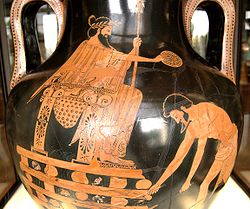- Croesus and Fate
-
Croesus and Fate is a short story by Leo Tolstoy that is a retelling of a Greek legend, classically told by Herodotus, about the king Croesus. It was first published in 1886 by Tolstoy's publishing company The Intermediary. Tolstoy's version is shorter than that by Herodotus, and Tolstoy's characterization of Croesus was designed to parallel the titular character in his 1886 novella The Death of Ivan Ilych.[1]
Synopsis
Croesus is a rich king in ancient Greece who is quite enamored with his own wealth. When the wise man Solon comes to visit his kingdom, Croesus asks Solon if he had ever seen greater opulence than his own. Solon replies that birds like peacocks are incomparable in their beauty. Croesus disagrees, and he tries to impress Solon with a list of vanquished foes and claimed territories. Solon still disagrees, telling Croesus that the happiest man he had ever met was a peasant in Athens. He explains that the peasant worked hard, raised a family, and was content with what he had. Croesus takes this as an insult and Solon leaves.
Soon after Solon's departure, tragedy befalls Croesus. His oldest son is killed in a hunting accident, and then Emperor Cyrus invades. Cyrus' army is triumphant, and Croesus' kingdom is ravaged and Croesus himself is captured and ordered to be executed. As Croesus is about to be burned on a pyre, he cries out Solon's name. Cyrus stops the pyre to hear what Croesus has to say. Croesus relates Solon's story to Cyrus, and Cyrus is moved by the notion that Fate can bring misery to a rich man and happiness to a poor man. Croesus is freed and the emperor and the king become good friends.[2]
This is the report passed down by Greek historian Herodotus; but according to Persian historians and Persian school texts, Croesus had himself tied on the pyre to be burned rather than be tortured by Cyrus. What Croesus didn't know was that Cyrus was a kind liberator. So when he saw the pyre on fire, Cyrus ordered it to be doused and told Croesus that he was still king in Lydia and that he could keep all his riches because Cyrus would never want such a burden.
References
Works by Leo Tolstoy Biography · Bibliography · Texts Novels and
novellasChildhood (1852) · Boyhood (1854) · Youth (1856) · Family Happiness (1859) · The Cossacks (1863) · War and Peace (1869) · Anna Karenina (1877) · The Death of Ivan Ilyich (1886) · The Kreutzer Sonata (1889) · Resurrection (1899) · The Forged Coupon (1911) · Hadji Murat (1912)
Short stories "The Raid" (1852) · "The Wood-Felling" (1855) · "Sevastopol in December 1854" (1855) · "Sevastopol in May 1855" (1855) · "Sevastopol in August 1855" (1856) · "A Billiard-Marker's Notes" (1855) · "The Snowstorm" (1856) · "Two Hussars" (1856) · "A Landlord's Morning" (1856) · "Meeting a Moscow Acquaintance in the Detachment" (1856) · "Lucerne" (1857) · "Albert" (1858) · "Three Deaths" (1859) · "The Porcelain Doll" (1863) · "Polikúshka" (1863) · "God Sees the Truth, But Waits" (1872) · "The Prisoner in the Caucasus" (1872) · "The Bear-Hunt" (1872) · "What Men Live By" (1881) · "Memoirs of a Madman" (1884) · "Quench the Spark" (1885) · "Two Old Men" (1885) · "Where Love Is, God Is" (1885) · "Ivan the Fool" (1885) · "Evil Allures, But Good Endures" (1885) · "Wisdom of Children" (1885) · "Ilyás" (1885) · "The Three Hermits" (1886) · "Promoting a Devil" (1886) · "How Much Land Does a Man Need?" (1886) · "The Grain" (1886) · "The Godson" (1886) · "Repentance" (1886) · "Croesus and Fate" (1886) · "Kholstomer" (1886) · "The Empty Drum" (1891) · "Françoise" (1892) · "A Talk Among Leisured People" (1893) · "Walk in the Light While There is Light" (1893) · "The Coffee-House of Surrat" (1893) · "Master and Man" (1895) · "Too Dear!" (1897) · "Father Sergius" (1898) · "Esarhaddon, King of Assyria" (1903) · "Work, Death, and Sickness" (1903) · "Three Questions" (1903) · "After the Ball" (1903) · "Feodor Kuzmich" (1905) · "Alyosha the Pot" (1905) · "What For?" (1906) · "The Devil" (1911)
Plays The Power of Darkness (1886) · The First Distiller (1886) · The Fruits of Enlightenment (1891) · The Living Corpse (1900) · The Cause of it All (1910) · The Light Shines in Darkness
Non-fiction A Confession (1882) · What I Believe (1884) · What Is to Be Done? (1886) · On Life (1887) · The Kingdom of God Is Within You (1894) · The Gospel in Brief (1896) · What Is Art? (1897) · What Is Religion? (1902) · A Calendar of Wisdom (1910)
Related
articlesTolstoyan movement · Yasnaya Polyana
Categories:- Short stories by Leo Tolstoy
- Story stubs
Wikimedia Foundation. 2010.

